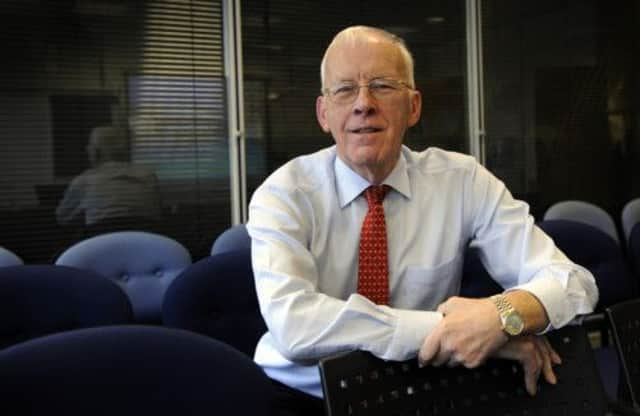Sir Ian Wood: Develop Scots’ vocational education


Oil tycoon Sir Ian Wood hit out at the “ingrained and ill-informed” view that vocational training was an inferior option to university, as he launched the report aimed at getting more young Scots into work.
But he also said business chiefs had to do more to give youngsters work experience and help develop apprenticeships.
Advertisement
Hide AdAdvertisement
Hide AdSir Ian headed the Commission for Developing Scotland’s Workforce, which published its first report yesterday. “In 21st-century Scotland, both academic and vocational education are critically important,” Sir Ian said.
“We’ve got this horrible cultural thing that somehow everyone’s trying to see the ultimate success as being higher education and a degree, when our society and modern industry is changing – it’s a different world.
“The kind of skills required go right across the board and there’s clearly a lot more room to significantly enhance the vocational output from schools.”
His group is calling for fourth-year pupils across Scotland to be allowed to study for National Certificates, which are currently taught in colleges.
The one-year qualifications offer training in work-orientated areas such as engineering, computing, cookery, hairdressing and tourism. Pupils could then go on to study for a Higher National Certificate either at college or in fifth and sixth year at school. There are currently 77,000 16-24 year-olds out of work in Scotland – a jobless rate of 19.1 per cent, almost three times the overall rate.
The Scottish Government wants to learn from places such as Germany, Austria and Scandinavia, where there is greater respect for vocational qualifications.
Sir Ian’s report also says pupils should have “world-of-work knowledge” as early as the first year of school and that colleges must ensure courses are far more geared towards the needs of industry.
The proposals come a week after an Audit Scotland report warned that funding for colleges was continuing to fall. The SNP’s political opponents say college budgets are being cut too far, with £34 million slashed in the past two years.
Advertisement
Hide AdAdvertisement
Hide AdIn his report, Sir Ian criticised some business leaders for failing to help train and employ school-leavers and his second report, due next spring, will focus on that issue.
He said: “I think there were some pretty hard words with some businesses, in some areas, in trying to get them more engaged and also more disposed to employing young people.”
Youth employment minister Angela Constance welcomed the report but said she would consult colleagues across all parties before responding.
Lauren Paterson, of business organisation CBI Scotland, said: “The default route of Highers then university is not suitable for all – young people learn in different ways and have different interests. Although just over half of young people in Scotland go to university already, we still need to expand and promote apprenticeships to equip young people with skills the economy needs.”
Andy Willox, of the Federation of Small Businesses (FSB), said: “For too long, many of our decision-makers haven’t realised the importance of vocational education to the real economy. The FSB welcomes this report because we understand a high-quality education and training system is vital to the country’s success.”
Larry Flanagan, general-secretary of teaching union the EIS, said: “We welcome the increased role for school/college partnerships in the development of increased opportunities for young people to secure high-skilled employment opportunities.”
NUS Scotland vice-president Robert Foster said vocational education should be of “the highest quality and esteem”.
• Engineering students ‘not up to scratch’
Students starting engineering courses at university need significant “remedial work” as they don’t have the necessary skills, an academic has claimed.
Advertisement
Hide AdAdvertisement
Hide AdProfessor Richard Brown, of Strathclyde University, told a Scotsman conference on the UK aerospace industry: “Students who come out of school are ill-prepared for a career in engineering and universities have to do significant remedial work. There is particular problem in mathematics. Students have not done the right kind of maths and schools have to come up to speed.”
Prof Brown, director of the Centre for Future Air-Space Transportation Technology at Strathclyde, added: “How do we engage young people in the aerospace industry? We have some problems.”
He urged schools to be far more imaginative in the projects they use to encourage young people to engage with science and engineering.
The conference, hosted by NATS Prestwick, heard Scottish Secretary Michael Moore outline a seven-year, £2 billion strategy for the UK aerospace industry.